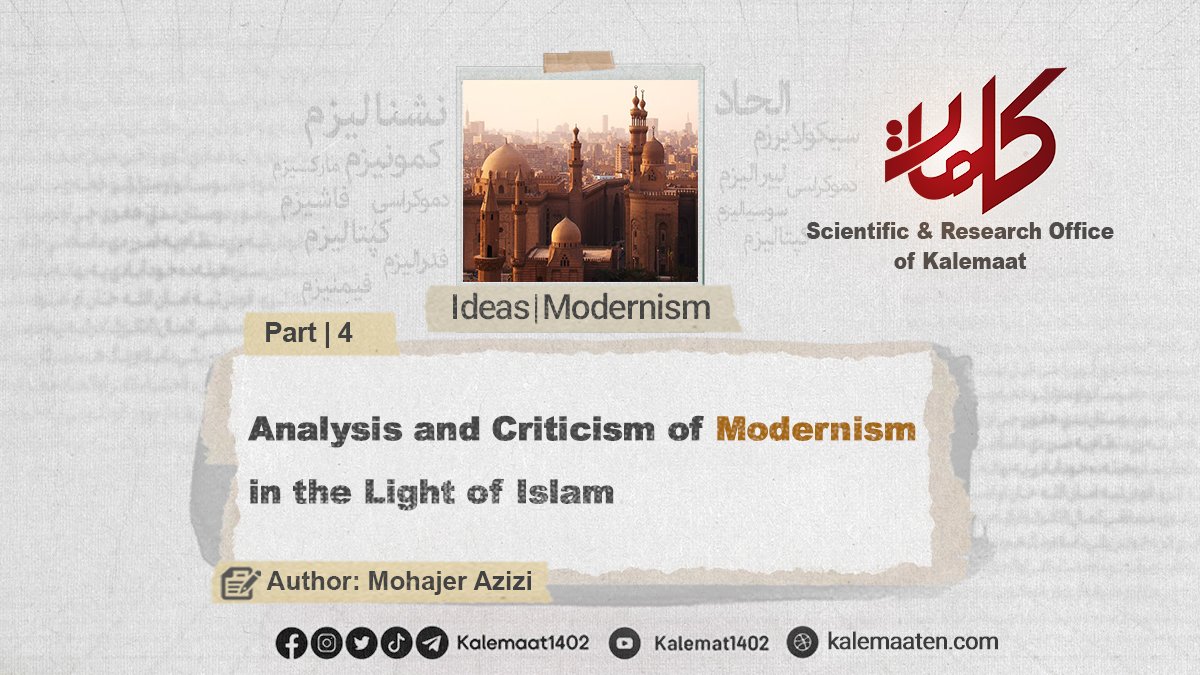Author: Mohajer Azizi
Analysis and Criticism of Modernism in the Light of Islam (Part 4)
Terms Related to Modernism
In order to understand and analyze the concept of “modernism” comprehensively, it is necessary to define and examine some of the terms related to it. In the following, these concepts are explained and their relationship with modernism is evaluated:
1. Rationalism
Rationalism as a school of thought believes that man can understand the truth of the world and existence only by relying on intellect and logic, without the need for divine revelation or personal and practical experiences. Proponents of this school believe that everything in the world must be measured by the standard of intellect in order to be able to recognize its existence or non-existence, as well as its characteristics. [1]
Rationalists have absolute trust in intellect and consider it the main reference for knowledge. They believe that concepts and ideas are present in intellect before entering the mind. They consider intellect to be a powerful tool in distinguishing and understanding things and give priority to rational and mental knowledge over sensory and empirical knowledge. This absolutism has distanced them from broader truths and placed them in a limited perspective.
A: The emergence of the rationalist school
The emergence and development of this school of thought can be divided into two periods:
1. Classical rationalism: this school was formed in ancient Greek philosophy, by figures such as Socrates and Aristotle.
2. New rationalism: this idea was developed in the modern and contemporary period, by philosophers such as Rene Descartes, Leibniz, Spinoza and others.
Rene Descartes (1596–1650), a French philosopher, used the rational method to prove existence; especially the existence of God (Allah). He based his method on a proposition that is considered undeniable from a rational perspective; and that is his famous sentence: “I think, therefore I am.”
Leibniz (1646–1716), a German philosopher, believed that every being has a kind of life, and the difference between beings lies in their degrees of perception. He considered four degrees for this difference: Absolute living being (which is called inanimate); 2. Plant; 3. Animal; 4. Human. [2]
B: The connection of rationality with modernism
Rationalism is one of the most fundamental components that has a deep connection with modernism, because one of the main theories and axes of modern thought is relying on intellect and rationalism. From the modernists’ point of view, intellect is considered a fundamental and key tool for achieving their intellectual and practical goals. All their behaviors, decisions, and analyses are based on the foundation of human intellect, they set aside revelation and the law and rely only on human intellect and logic in such a way that in the process of measuring and examining phenomena and concepts.
While it must be admitted that human intellect, although valuable and effective, is incapable and limited in responding fully to all phenomena and issues of life. Intellect cannot chart the path to true human happiness and prosperity alone, because it is often caught in the trap of sensual feelings and desires, and these feelings do not have the ability to distinguish between happiness and misery.
In this context, the famous jurist, Dr. Friedman, says: “intellect is a prisoner of human feelings and desires and has no choice but to do so. Intellect has no other duty than to serve these feelings.” [3]
Allamah Mufti Muhammad Taqi Usmani (may Allah protect him) writes about how thought and intellect become prisoners of feelings: “It is obvious that whenever a person follows an irreligious thought, there is no such thing as morality left. In such a case, a person is completely dominated by feelings and desires. Intellect or free thought can never coexist with religion and morality; because as a result of modernism and extreme rationalism, a situation arises where a person considers an act to be reprehensible from the perspective of conscience, but from the perspective of modernist intellect, he does not find a reason for its wrongness, and inevitably does it.”
Allamah Usmani considers this situation to be one of the greatest challenges facing thinkers of the present era and adds: “Today, Western thinkers are facing the same dilemma. For example, the legalization of homosexuality, which was approved in the British Parliament a few years ago, although many people were against it; but because no rational intellect was presented to reject it, they were forced to accept it. From the modernist point of view, any phenomenon that spreads, even if it is ugly and dangerous, must ultimately be recognized by law.” [4]
Continues…
Previous Part/ Next Part
References:
1. The Simplified Encyclopedia of Religions and Sects, Vol. 2, p. 796.
2. Ibid., vol. 2, p. 796.
3. Mohammad Taghi Usmani, Modernism from the perspective of Islam, p. 17.
4. Ibid., p. 17.



